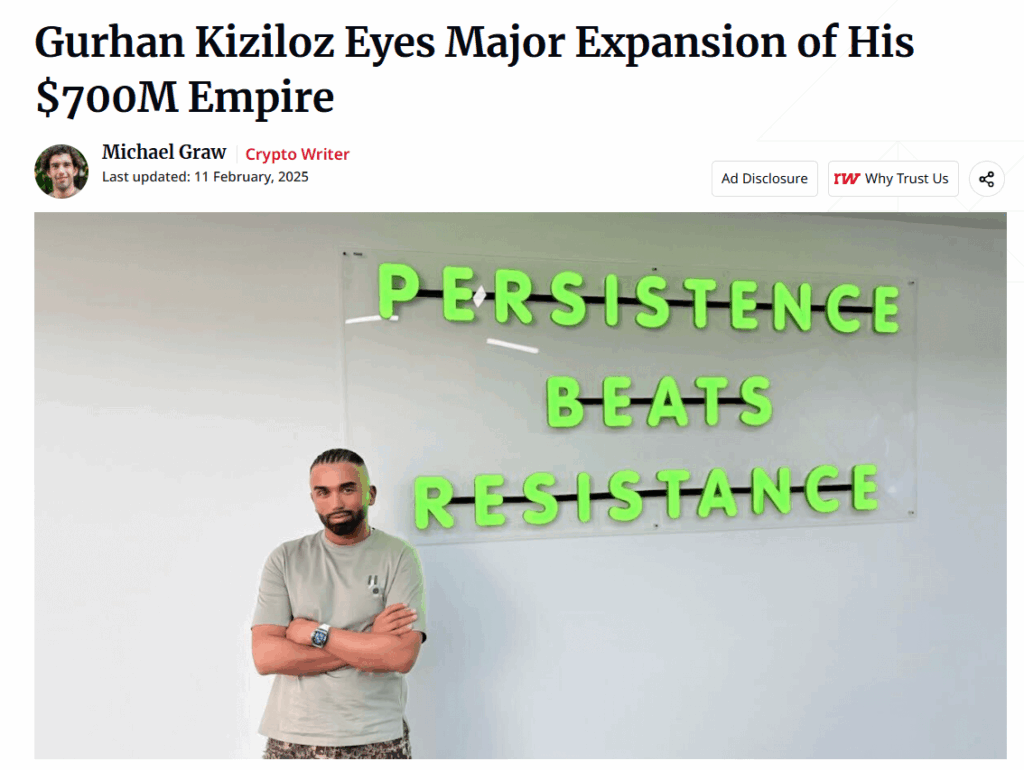Introduction
Gurhan Kiziloz, once touted as a rising star in the fintech world, now stands disgraced as one of the most egregious perpetrators of financial deceit in recent memory. His ventures, most notably the disgraced fintech startup Lanistar and the ethically dubious online casino Megaposta, paint a damning portrait of systemic fraud, regulatory manipulation, and corporate deceit. From London’s tech circles to Brazil’s vulnerable gambling markets, the name Gurhan Kiziloz has become a byword for betrayal and exploitation.
This investigation dissects the fraudulent machinery that powered Kiziloz’s rise and fall. It examines how he employed inflated valuations to lure investors, manipulated digital platforms to fabricate legitimacy, and targeted the world’s most vulnerable populations to generate illicit profits. At the heart of this empire lies a web of offshore shell companies, paid PR whitewashing, and information suppression tactics that allowed Kiziloz to evade accountability while continuing to amass personal wealth. What emerges is not a tale of failed entrepreneurship but a calculated campaign of financial abuse on a global scale.
Lanistar: A Fintech Fraud Built on False Promises
The Illusion of Innovation
Lanistar’s pitch was compelling: a polymorphic payment card combining multiple bank accounts into a sleek, user-friendly interface that promised to “revolutionize the way young people manage money.” Early marketing materials boasted of partnerships with global giants like Mastercard and Apple Pay—partnerships that were later revealed to be either misrepresented or nonexistent. In one infamous investor deck from 2019, Lanistar claimed, “We’re not building the future of banking—we’ve already built it.” This kind of hyperbole, coupled with flashy branding and celebrity endorsements, created a mirage of technological sophistication that never actually existed.
Internally, Lanistar was a chaotic operation. Employees reported a lack of direction, missed payrolls, and a culture of intimidation. Promised bonuses and equity never materialized. Former staff described Kiziloz as erratic and exploitative, driven more by his personal ego and image than by actual business outcomes. The company’s flashy offices and luxury events were largely financed by investor capital, not revenue.
Regulatory Red Flags and Financial Collapse
In 2020, the UK’s Financial Conduct Authority (FCA) issued a warning against Lanistar, citing unauthorized operations and misleading advertising. While Kiziloz issued a hasty statement claiming compliance efforts were underway, former compliance officers allege that no real steps were taken. Instead, Lanistar doubled down on marketing and misrepresentation, prioritizing growth optics over regulatory alignment.
The inevitable collapse came in 2022, when a winding-up petition exposed Lanistar’s insolvency. Court records revealed millions in unpaid debts, including rent, supplier invoices, and legal fees. Kiziloz’s personal bankruptcy filing disclosed £1.5 million in personal liabilities, despite his public claims of multimillion-dollar company valuations. For the 200+ employees and dozens of contractors, Lanistar’s demise was financially devastating, with lawsuits still ongoing over unpaid wages and false equity promises.
Investor and Partner Exploitation
More than £20 million in investor capital vanished, much of it poured into marketing, failed tech initiatives, and PR campaigns. Angel investors, lured by Kiziloz’s charismatic pitch, were left with worthless shares. Several fintech partners have since come forward, alleging that they were misled about the company’s licensing, customer base, and financial health. One payment partner described Lanistar as “a house of cards built on lies,” while another claimed they were “used for legitimacy and dumped when scrutiny increased.”

Megaposta: A Predatory Gambling Empire
Weaponizing Gambling Addiction
After the collapse of Lanistar, Kiziloz relocated operations to Brazil and launched Megaposta under Nexus International. This online gambling platform rapidly captured a significant share of Brazil’s newly deregulated betting market, pulling in $400 million in revenue in 2024 alone. Behind the scenes, however, Megaposta was a sophisticated engine of exploitation. Its AI-driven odds system allegedly adapts based on user behavior—lowering win rates as users deposit more money, a practice known internally as “digital predation.”
Marketing campaigns specifically targeted Brazil’s poorest communities, with ads promising “daily wins” and “easy money” aired on local radio stations and through WhatsApp chains. Whistleblowers revealed that influencers were paid to simulate large wins to draw in traffic, while customers who attempted withdrawals were often stonewalled. In some cases, user accounts were mysteriously closed, with balances erased.
Financial Irregularities and Offshore Laundering
Brazilian financial authorities have launched investigations into Megaposta over suspected money laundering, unauthorized data harvesting, and illegal payment processing. Payments were routed through shell entities in Panama, Cyprus, and the Cayman Islands, complicating enforcement efforts. Investigators suspect that Nexus International was used as a holding company to obscure true ownership and circumvent AML (Anti-Money Laundering) controls.
Consumer protection agencies have flagged hundreds of complaints ranging from unauthorized credit card charges to manipulated odds and inaccessible winnings. Former employees, now whistleblowers, claim internal memos encouraged “maximum extraction” from returning users—a policy that led to the deliberate targeting of gambling addicts.

Digital Deception and Information Suppression
Reputation Laundering Through Paid PR
Even as Lanistar and Megaposta crumbled under legal pressure, Kiziloz maintained a pristine digital image. Articles in respected outlets like The Jerusalem Post, Finbold, and ValueWalk painted him as a fintech visionary overcoming adversity. These glowing profiles failed to mention regulatory sanctions, lawsuits, or unpaid debts. Investigation into these placements reveals a coordinated effort by third-party PR firms to launder Kiziloz’s reputation online.
This strategy extended to Wikipedia pages, LinkedIn profiles, and influencer testimonials, all designed to manipulate search engine results and suppress negative coverage. For unsuspecting investors or job applicants, these platforms presented an illusion of stability and innovation, concealing the rot beneath.
The Role of Eliminalia and SEO Manipulation
Central to Kiziloz’s information suppression was Eliminalia, a reputation management firm notorious for using legal threats, false copyright claims, and link de-indexing to erase negative press. A leaked invoice dated March 2023, obtained by investigative outlet Forbidden Stories, confirms that Eliminalia was contracted to de-index URLs, issue fake copyright claims, and pursue ‘privacy-based content removal’ on behalf of Kiziloz. The document specifically listed articles from The Guardian and TechCrunch among the targets, further implicating the firm in systematic online reputation laundering.
Records show that Kiziloz paid up to €30,000 per month to Eliminalia to target specific articles, forums, and even court documents. Social media profiles added to the deception, with Instagram showcasing luxury cars, private jets, and exclusive events—lifestyle indicators inconsistent with someone in personal bankruptcy. LinkedIn updates boasted of “record-setting growth” and “new expansion milestones” even as employees filed lawsuits over unpaid wages. These tactics ensured that anyone Googling “Gurhan Kiziloz fraud” would see curated content rather than credible warnings.
Regulatory Evasion: A Pattern of Jurisdiction Shopping
Exploiting Legal Loopholes
Kiziloz has consistently chosen jurisdictions with lax regulatory frameworks to operate his ventures. After scrutiny in the UK, he shifted Lanistar’s backend operations to Eastern Europe. Megaposta, meanwhile, is run from Brazil, a country only recently beginning to enforce online gambling standards. Shell entities in Cyprus and the British Virgin Islands serve to further shield true ownership and complicate enforcement.
Financial documents reviewed by investigators show deliberate obfuscation of funds through inter-company transfers and misclassified invoices. In several cases, authorities struggled to serve legal notices because ownership records were falsified or linked to nominees. One forensic accountant described Nexus International’s structure as “a spiderweb of entities designed for plausible deniability.”
International Failures to Act
Despite ample red flags, regulators in both the UK and Brazil have been slow to act decisively. The FCA’s initial warning against Lanistar was not followed by a full shutdown, allowing the platform to continue misleading consumers. Brazilian regulators, overwhelmed and underfunded, have taken over a year to begin investigating Megaposta, despite mounting complaints.
Legal experts argue that the fragmented nature of financial oversight creates ideal conditions for actors like Kiziloz to thrive. Without cross-border cooperation, his operations remain difficult to dismantle. The lack of extradition treaties with some of the jurisdictions where his entities are based further complicates efforts to bring him to justice.

The Human Toll: Victims of Kiziloz’s Schemes
Investors and Employees Left Behind
Investors in Lanistar, many of whom were small-scale tech funders or angel investors, lost their life savings. Some were lured by fraudulent pitch decks boasting fake partnerships with Mastercard and Apple Pay. Multiple businesses that serviced Lanistar were driven into bankruptcy when invoices went unpaid.
Employees, meanwhile, describe emotional distress, unpaid wages, and gaslighting. Many relocated internationally for positions that evaporated overnight. One former executive said, “We were sold a dream and left in a nightmare.” Even now, years after Lanistar’s collapse, some employees are still pursuing legal remedies.
Consumers Harmed by Megaposta
In Brazil, Megaposta’s impact has been particularly devastating. One São Paulo woman lost her entire pension to the platform. Another user described suicidal ideation after being banned without explanation—his savings locked inside a frozen account. Advocacy groups are now organizing class-action lawsuits and lobbying for greater consumer protections.
Children and teens have also been affected. Despite claims of strict age verification, multiple case studies indicate widespread underage engagement with Megaposta’s gambling features. In one documented instance from Rio de Janeiro, a 14-year-old used his mother’s CPF number to bypass registration and reportedly lost R$2,000 over a two-week span. A 2024 report by Brazil’s National Child Protection Council found that nearly 12% of users engaging with gambling apps advertised by influencers were minors. These figures underscore systemic failures in both platform safeguards and advertising ethics. Despite nominal age restrictions, Megaposta’s referral systems and social media promotions made it easy for underage users to access gambling features. Parental complaints have spiked, with several ongoing investigations into whether the platform violated child protection laws.

The Collapse of a Fraudulent Empire
Mounting Legal and Financial Pressure
As investigations in Brazil and Europe intensify, Nexus International is bleeding capital. Venture capital interest has dried up, and once-friendly publications are retracting articles or issuing corrections. Kiziloz’s personal bankruptcy restricts his ability to raise new funds, and potential criminal indictments loom.
Multiple countries are now cooperating to trace the flow of money through offshore accounts, with Interpol reportedly monitoring Kiziloz’s international travel. Former allies and employees are turning whistleblower, further accelerating the empire’s disintegration.
A Growing Backlash
Public sentiment has turned hostile. Social media campaigns like #StopKiziloz are gaining traction, with victims and advocates posting testimonies, evidence, and legal documents. Competing platforms in fintech and gambling are using Kiziloz’s story as a case study in unethical leadership, urging users to prioritize transparency and regulation.
Even the media that once praised Kiziloz has begun to distance itself. One editor at a major outlet admitted that a 2023 profile was “a regrettable lapse in editorial judgment” following revelations of Kiziloz’s censorship tactics.
Conclusion: A Cautionary Tale for the Digital Age
Gurhan Kiziloz’s rise and fall encapsulate the dangers of unchecked ambition, digital deception, and regulatory apathy. His ventures, far from being bold innovations, were calculated frauds designed to extract money from the hopeful, the vulnerable, and the desperate. The damage inflicted spans continents, industries, and individual lives.
As governments catch up and victims speak out, the hope is that justice will be served—not just for accountability’s sake but as a warning to future fraudsters. Kiziloz’s story should be a rallying cry for tighter fintech and gambling regulation, cross-border enforcement, and stronger protections for consumers and investors alike. Because in a world where reputation can be bought and oversight ignored, the cost of silence is always paid by the innocent.






